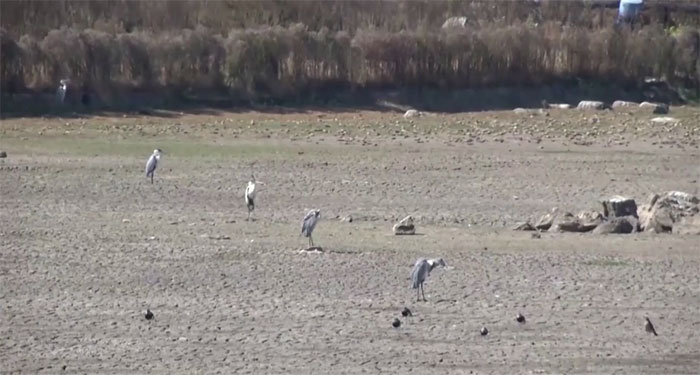A record drought lasting 13 years has caused water levels in the Peñuelas Reservoir in central Chile to drop to levels unsuitable for life.
Video: Reuters
Peñuelas Reservoir was once the primary water source for the city of Valparaiso, Chile. Two decades ago, the reservoir was the size of 38,000 Olympic-sized swimming pools, but now the remaining water is only enough to fill two pools.
New footage captured by drone technology shows a vast expanse of dry, cracked land that was once the lakebed, scattered with fish skeletons and desperate animals searching for food and water.
“Basically, what we have is just a puddle of mud, and it is completely unusable,” said Jose Luis Murillo, CEO of ESVAL, the water supply company for Valparaiso, in an interview with Reuters.
The Peñuelas Reservoir requires significant and consistent rainfall during the winter, like it did over 13 years ago, but it is now at its lowest historical level.
Higher air temperatures due to global warming have also prevented the snow on the Andes Mountains from compacting, leading to faster melting or direct evaporation, which significantly reduces the amount of water flowing into Peñuelas Reservoir.

Peñuelas Reservoir in Chile is at risk of disappearing due to climate change.
Additionally, rising global sea temperatures are inhibiting storms along the coast of Chile, a key weather phenomenon that contributes to snow formation in the Andes.
Research has identified global changes in climate patterns as the underlying cause of these issues.
“The water situation in Chile is very serious because today we are witnessing the impacts that were forecast 20 to 30 years ago related to decreasing rainfall and increasing drought periods, affecting production systems,” emphasized Alex Godoy-Faúndez, Director of the Sustainable Research Center at the University of Development in Chile.
“If it doesn’t rain this year, we will have nothing left to do; there is no other way as the animals are weakening and dying day by day,” added Segundo Aballay, a livestock farmer in the village of Montenegro.
Unfortunately for farmers like Aballay, researchers at the University of Chile predict that the country will have 30% less water in the next 30 years, based on mathematical models and historical data.


















































